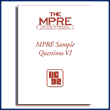 Tomorrow (August 17, 2013), the National Conference of Bar Examiners (NCBE) will administer the Multistate Professional Responsibility Examination (MPRE) to applicants seeking admission to practice law in Louisiana and most other jurisdictions in the United States. The MPRE is a 60-question, two-hour, multiple-choice examination on legal and judicial ethics.
Tomorrow (August 17, 2013), the National Conference of Bar Examiners (NCBE) will administer the Multistate Professional Responsibility Examination (MPRE) to applicants seeking admission to practice law in Louisiana and most other jurisdictions in the United States. The MPRE is a 60-question, two-hour, multiple-choice examination on legal and judicial ethics.
More importantly, the MPRE is a joke. It is a relatively “low stakes” examination that is offered three times each year. It is in multiple-guess format, which makes it painless to sit through even if you don’t know the answers. No shame or embarrassment is associated with failing it. Perhaps for these reasons, applicants spend very little time studying for the test. Indeed, most spend 4-5 hours casually reading over a canned study guide. I’ve overheard law students talking about studying for the MPRE in terms of how many beers it involves rather than how many hours. My experience is not unusual (see this discussion on Legal Ethics Forum).
Not only is the MPRE easy, it does not adequately test important areas of law that every lawyer must know. For example, it does not test sufficiently the trust accounting issues that trip up so many young lawyers. It does not test basic law office management and practice principles. It does not test the significant differences between the Louisiana Rules of Professional Conduct and the ABA Model Rules (such as differences in handling client funds, providing financial assistance to clients, imputed disqualification, advertising, reporting professional misconduct, to name just a few). It does not test the basic structure of the Louisiana disciplinary system or the Louisiana disciplinary process. Quite obviously, every lawyer with a law license needs to know these things.
To address these problems with the MPRE, the Louisiana Supreme Court should supplement or replace it with a legal ethics test on the “real” bar examination, that is, on the essay portion of the exam. Students take the essay examination very seriously: they study for the exam all spring and summer because failure is devastating (both emotionally and economically). By testing legal ethics on the essay examination, the court could assure that new Louisiana lawyers understand their basic ethical obligations—including those peculiar to Louisiana—prior to being licensed. Surely such topics are more important to every Louisiana lawyer than many that are now tested on the essay portion (such as ownership of water bottoms, for instance).
This suggestion is not new. More than a dozen years ago, the Louisiana Supreme Court’s “Committee for the Prevention of Lawyer Misconduct” recommended that the Committee on Bar Admissions test legal ethics on the essay portion of the Louisiana bar examination. See Report of Committee for the Prevention of Lawyer Misconduct (Sep. 15, 2000). The Louisiana Bar Admissions Advisory Committee also made similar recommendations at around that time. Most recently, the Louisiana Attorney Disciplinary Board adopted a resolution calling for the court to add ethics to the essay exam. For reasons unknown, however, the suggestion has been ignored by the Committee on Bar Admissions. To this day, Louisiana relies solely upon the MPRE to assure that its new lawyers have the ethical competency to practice law.
So tonight, bar applicants all over Louisiana will pop open a beer (or three) and prepare for tomorrow’s MPRE. Good luck to them all—not that they need it. And cheers.
